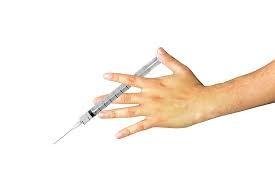TETANUS
Tetanus is an acute disease of the nervous system that was once a major killer, especially in the rural areas. Each year it strikes fewer than 500 persons in the United States, thanks to widespread and early immunization against it. The early detection of symptoms and inoculation with neutralizing antitoxins have also contributed to the decrease in fatalities. Tetanus is frequently called lockjaw because one of the early symptoms is a paralyzing spasm of the muscles involved in opening the mouth.
Causes
Tetanus is caused by the toxin of the microorganism Clostridium tetani, found in the soil and dust, and in the intestines of horses, cows and man. The infection is spread by contaminated animal and human feces. The germs may enter the body through any break in the skin, such as might result from a puncture wound, an insect sting, an animal bite, or a gunshot wound.
Symptoms
In some cases, the infected wound site may heal, but usually, the area becomes sore and inflamed. Within about three weeks, the victim becomes irritable and restless, experiencing stiffness in the neck and difficulty in swallowing. Severe muscular spasms occur in the abdomen, back and face. Slight disturbances, such as a creaking door a sudden draft, will trigger painful convulsions.
Complications
If convulsions are sufficiently severe, respiration may fail, leading to fatal asphyxiation.
Treatment
A doctor should be consulted promptly if there is even a remote possibility that a wound has been contaminated by the tetatus bacillus. This might occur when walking barefooted in a barn and picking up a splinter or stepping on a nail; falling in a pasture and getting deep scratches contaminated with dry cow droppings; and the like. The doctor takes into account the date of the victim‘s last dose of antitoxin or booster shot of tetanus toxoid. When passive immunization is indicated, human antitetanus globulin is preferred to horse serum if it is available. Antibiotics are also given, and if a tetanus attack should occur, anticonvulsants and sedatives are administered. Where emergency hospitalization is esential, the victim may be placed in a hyperbaric chamber to combat the risk of respiratory failure.
Prevention
Immunization against tetanus is one of the routine procedures of infant care. At six months, a baby has usually received a series of three shots containing toxoids against diphtheria, pertussis (whooping cough), and tetanus. Booster shots are administered at suitable intervals. Adults who have not had a booster shot within a five-year period should be especially alert to the dangers of infection, especially on farms and in stables.

Hi, @dyan8!
You just got a 0.02% upvote from SteemPlus!
To get higher upvotes, earn more SteemPlus Points (SPP). On your Steemit wallet, check your SPP balance and click on "How to earn SPP?" to find out all the ways to earn.
If you're not using SteemPlus yet, please check our last posts in here to see the many ways in which SteemPlus can improve your Steem experience on Steemit and Busy.
Congratulations! This post has been upvoted from the communal account, @minnowsupport, by safflongtime from the Minnow Support Project. It's a witness project run by aggroed, ausbitbank, teamsteem, someguy123, neoxian, followbtcnews, and netuoso. The goal is to help Steemit grow by supporting Minnows. Please find us at the Peace, Abundance, and Liberty Network (PALnet) Discord Channel. It's a completely public and open space to all members of the Steemit community who voluntarily choose to be there.
If you would like to delegate to the Minnow Support Project you can do so by clicking on the following links: 50SP, 100SP, 250SP, 500SP, 1000SP, 5000SP.
Be sure to leave at least 50SP undelegated on your account.